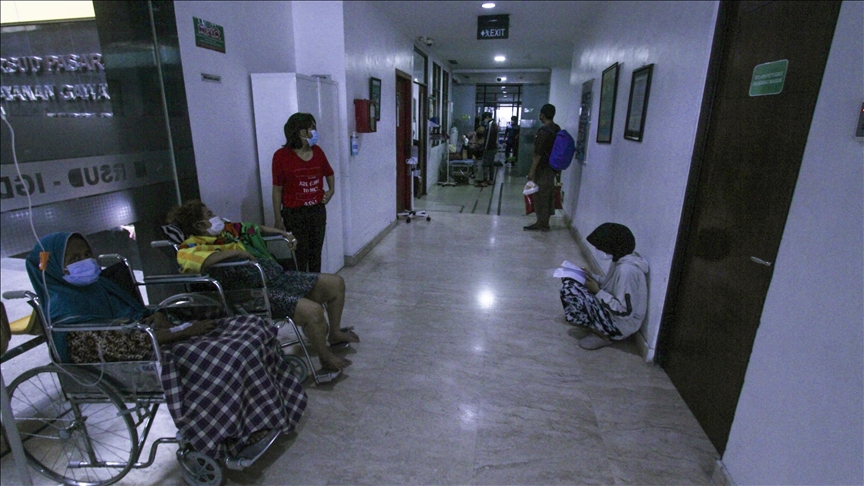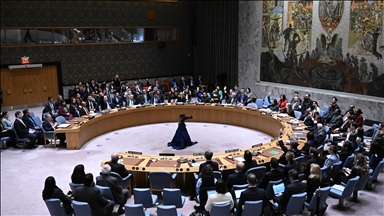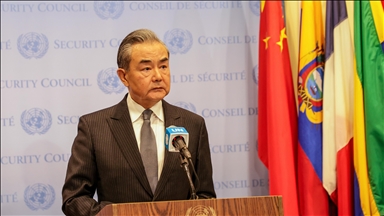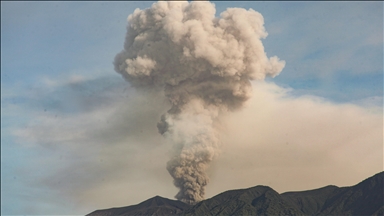As facilities collapse, Indonesia doctors must choose among virus patients
Medical personnel no longer able to treat all who come to hospitals, says emergency medicine specialist
 Covid-19 patients wait in the Emergency Room at the Pasar Rebo Regional General Hospital (RSUD) in Jakarta, Indonesia on Thursday 8 July 2021. Indonesia on Thursday confirmed its highest daily coronavirus infections since the start of the pandemic, registering 38.391 new cases in the last 24 hours, raising the caseload to 2.41 million. ( Eko Siswono Toyudho - Anadolu Agency )
Covid-19 patients wait in the Emergency Room at the Pasar Rebo Regional General Hospital (RSUD) in Jakarta, Indonesia on Thursday 8 July 2021. Indonesia on Thursday confirmed its highest daily coronavirus infections since the start of the pandemic, registering 38.391 new cases in the last 24 hours, raising the caseload to 2.41 million. ( Eko Siswono Toyudho - Anadolu Agency )
JAKARTA, Indonesia
The recent surge in coronavirus infections that exceeded the capacity of hospitals has forced doctors in Indonesia to make difficult decisions regarding life.
Emergency medicine specialist Corona Rintawan told Anadolu Agency he could not help but choose patients who had better chances for treatment.
Rintawan works at the Muhammadiyah Lamongan Hospital in East Java, where beds in emergency and isolation rooms are fully occupied despite continuous additions.
He said the majority of patients come with severe symptoms and oxygen desaturation, while some had to wait for up to three days to get a room.
Rintawan said personnel are no longer able to treat all patients who came to the hospital.
“We were forced to exclude those, who in theory, given any kind of therapy, will not improve. It wasn’t easy to decide," he said.
Rintawan said it has created psychological pressure for medical personnel as the number of patients requiring intensive care is always higher than available rooms and ventilators.
"For example, if we choose someone to be treated with a ventilator, but after four to five days they don't get better, some of us would think ‘what if it was given to another patient yesterday, would they survive?’ It became a moral burden for us,” he added.
Never been situation this bad
Rintawan said in his 18-year career in emergency medicine, he has never seen a facility face a crisis as bad as this, even when a massive disaster hit the country like the Aceh tsunami in 2004.
Indonesia continues to report record high daily cases, peaking Thursday at 38,391 infections.
The spike became the highest in the Southeast Asian region, while daily fatalities are one of the highest in Asia.
“The Aceh tsunami, SARS outbreak -- it wasn't this bad. The senior doctors never told stories as bad as this," he said.
In the context of natural disasters, Rintawan said crises usually occur only in a limited area and aid can be mobilized from other areas.
"As this pandemic is greatly widespread, it is difficult to help other areas because we ourselves are struggling to survive," he said.
The high mobility of people during the Muslim eid holiday later this month and the rapid spread of the Delta variant is believed to be the reason for the recent surge in infections, pushing the health system to the brink as hospitals run out of oxygen, beds, medicines and staff.
Rintawan said a lot of personnel had no time to self-isolate as they had to continue working because of a staff shortage.
At least 1,183 health workers have died since the start of the pandemic and the number has increased significantly from June to July, according to Data Report Covid19, a civilian initiative.
"Functionally, we could say that health facilities have collapsed," he added.
Collapse of health facilities leads to high fatalities
Windhu Purnomo, an epidemiologist from Airlangga University, said the collapse of health facilities leads to high fatalities from the virus.
According to data by the Ministry of Health, 5,269 deaths were reported in the past week, with the highest daily surge of 1,040 recorded Wednesday, bringing the death toll to 63,760.
Purnomo told Anadolu Agency that patients in self-isolation had difficulty getting treatment when their condition worsened.
"In the end, many died at home due to fully occupied hospitals, unavailability of isolation beds, or it was too late to get oxygen treatment," he said.
In the past week, dozens of hospitals in Surabaya and Bandung temporarily closed their emergency rooms as they were no longer able to treat patients and oxygen supplies were running low.
Field hospitals have been built in various cities on the island of Java and some in Jakarta have turned their emergency rooms into isolation rooms, while emergency treatment was administered in emergency tents.
Despite the government’s effort to increase the capacity of beds for COVID-19 patients, Purnomo said the burden on health workers has been very heavy and they could no longer keep pace with the number of patients to be treated.
The epidemiologist urged the government to curb the spread of the virus to reduce the burden on health facilities whose conditions are far from ideal.
"No matter how much we expand the treatment capacity, if the number of new patients keeps flowing like floods, it will never be enough," he added.
Call for moment of silence
Minister of Religious Affairs Yaqut Cholil Qoumas urged the nation to observe a moment of silence and pray for patients who have died from the virus.
“On Saturday, July 10, at 10.07 a.m, let's have a moment of silence for 60 seconds. Wishing the best for the health workers, volunteers, the people, and those who have gone before us," Qoumas said in a statement.
He expressed hope that it could foster the strength of mutual solidarity to work together in the battle against pandemics.
*Writing by Rhany Chairunissa Rufinaldo, contribution by Adelline Tri Putri Marcelline with Anadolu Agency’s Indonesian language services in Jakarta








